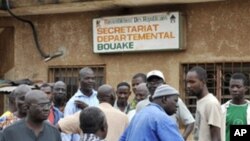Ivorians in the country's troubled western regions continue to call for peace as the country waits for results in its long-delayed presidential election.
After five years of repeated delays, voters in Ivory Coast went to the polls Sunday for a presidential election meant to reunite the country after a 2002-2003 civil war split it between a government-held south and a rebel-held north.
As votes are being counted, Ivorians are keeping a close eye on the country's volatile western regions where there are concerns that disputes over results could reignite violence.
Even before official campaigning began in October, Ivorian non-profits, like the Coalition for Peace and Development in Ivory Coast, were active in the west, encouraging residents to vote, and to do so in peace.
Coalition leader in the regional capital of Daloa, Terese Seri-Kanon, said their message is simple, without peace, the region cannot rebuild. She said no matter who is the next president, everyone must remember that it is Ivory Coast that wins in this election. To have peace, she says, the results must be accepted.
She said they launched their message on community radio stations and outside the region's churches and mosques.
In Daloa, the coalition met with small local women's groups like the Neighbor's Association.
Group member, Elise Dogba, said markets are empty because farmers are too scared to transport produce. She said their children have degrees, but no jobs. She said they do not bother to go to the hospital because they cannot afford medicine. She said they need security and a successful election to repair damage caused by the crisis.
It is often youth who go out into the streets to protest, and Dogba said, thanks to training from the coalition, women of her group are urging their children to stay calm as votes are counted.
In this election outreach, the coalition, and other local non-profits, were supported by the U.N. Operation in Ivory Coast.
From its regional headquarters in Daloa, the U.N. Operation has worked to promote peace and reconciliation throughout the country's troubled western region since 2007.
The operation's public information head, Malick Faye, said Sunday's election was encouraging, but challenges remain. Faye said there is insecurity, especially in the region of Moyen Cavally. He says there are problems of sexual violence against women. He said the United Nations works with traditional chiefs to resolve inter-community conflicts, which he said are a central problem in the West and are often related to land ownership.
The country's 14 presidential hopefuls have also called for peace and patience from supporters, as votes are tallied.
Serge Kouame Oi Kouame is youth leader in Daloa for the party of main opposition candidate, Henri Konan Bedie. He said youth are growing impatient, but he hopes everyone, especially young people, will stay calm and accept provisional results. He said he hopes politicians will not tell youth to take to the streets in protest.
The country's electoral commission has until Wednesday to announce provisional results.




